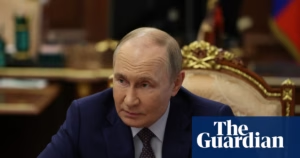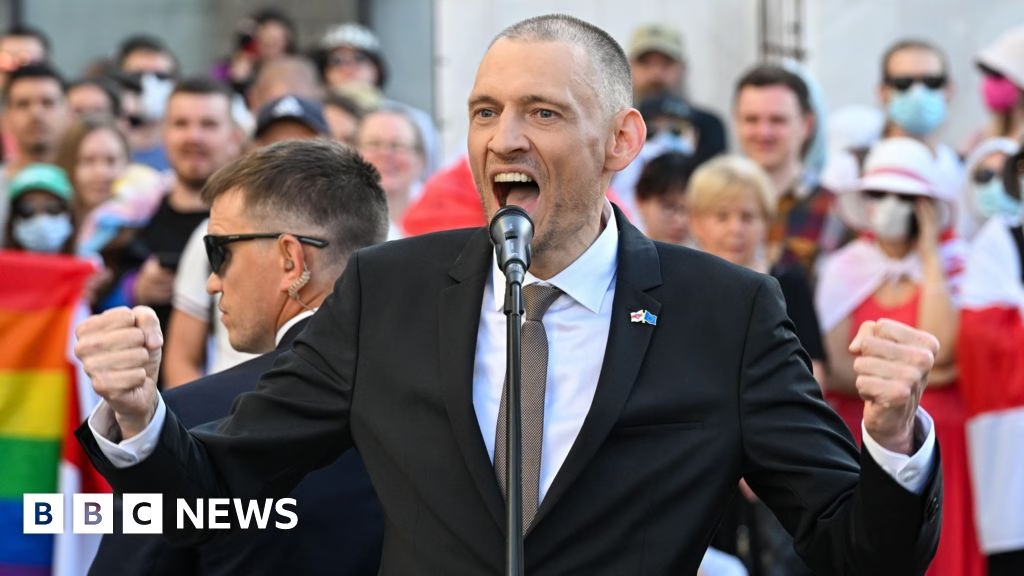Sergei Tikhanovsky Freed: A Journey from Imprisonment to Exile
By Sarah Rainsford
Eastern and Southern Europe Correspondent
Sergei Tikhanovsky, the former opposition blogger from Belarus, stood before the Copernicus Monument in Warsaw, his fists clenched and speaking animatedly – a stark difference from his previous five years of silence, spent in the solitary confinement of a high-security Belarusian prison. Now free, his thoughts bubble forth with an intensity that his own mind can barely keep pace with.
"My speech wasn’t the hardest part," Sergei confided soon after his surprise release, when I met him in Vilnius. "When you’re unable to speak or write, you can’t communicate with anyone and you’re trapped in a cell – that’s the toughest thing, not the restriction on movement."
Forced into exile, Sergei’s freedom came as part of a deal after a high-level US delegation visited Belarus’ autocratic leader, Alexander Lukashenko. Never before has there been public knowledge of such a visit from the West, adding particular significance to the diplomatic overture.
When reminiscing about his reunion with his family, Sergei struggles to maintain his composure. His daughter was just four years old when he was imprisoned; "She didn’t recognize me at first," he managed to say after a poignant pause, "then she flung herself into my arms, and we held each other for a long time."
The toll of his incarceration is apparent in Sergei’s physical transformation. From once being a stocky man with a beard, he is now gaunt, his body almost half the weight of his former self. Despite the drastic changes, he insists that "physically, I’m half the person I used to be, but my spirit remains unbroken – perhaps even stronger."
Prior to his unprecedented release, Sergei Tikhanovsky was among the most prominent political prisoners in Belarus. Using YouTube before the 2020 election, he gained a significant following by filming candid interviews that highlighted the citizens’ grievances against the regime. When he actually attempted to run in the elections, the authorities arrested him.
Sergei’s wife, Svetlana Tikhanovskaya, ran in his place, drawing massive crowds. Following another implausible victory for Lukashenko, these crowds turned into protests, only to shortly after become a series of mass arrests.
During his time in prison, Sergei was often targeted for ill-treatment, representative of the regime’s tactic towards those they deem most threatening. Cut off from the world, not allowed even a religious visitation, survival was a daily struggle.
Conversely, the journey to freedom began to take shape in August when the deputy prosecutor visited the prisons, urging political detainees to request the dictator’s pardon. Lukashenko, eager to appear merciful, released several prisoners – yet Sergei and several other high-profile figures remained excluded.
Despite the potential for personal freedom, Sergei refused to consider confessing to fabricated charges. "I am not a criminal," he explains. "It would betray those who support me."
Eventually, the U.S. intervened, and as special envoy Keith Kellogg brokered negotiations to secure the release of American prisoners, Sergei was also included in the deal. Lukashenko, under increased isolation from Western countries and unwavering in his allegiance to Russia, seized the opportunity to demonstrate a newfound willingness for dialogue.
With more than a thousand political prisoners still behind bars, Sergei’s heart aches for their liberation. The recent detentions following his own release serve as a grim reminder that the regime’s position remains unaltered.
Svetlana, now leading the opposition, fears the easing of sanctions against Belarus would be premature, citing the swap of freedom for her husband and others against immediate further detentions as evidence of Lukashenko’s unchanged policies.
In his first week of freedom, Sergei has been a flurry of political activity, having met with politicians, made public speeches, and even taken the time to write to Donald Trump expressing his gratitude. While his personal ambitions may have altered, his commitment to seeing a democratic Belarus remains steadfast, unyielding in the face of adversity.
As the white and red flag of the Belarusian opposition waves proudly, Sergei Tikhanovsky’s story is a testament to the enduring spirit of resistance against dictatorship.







